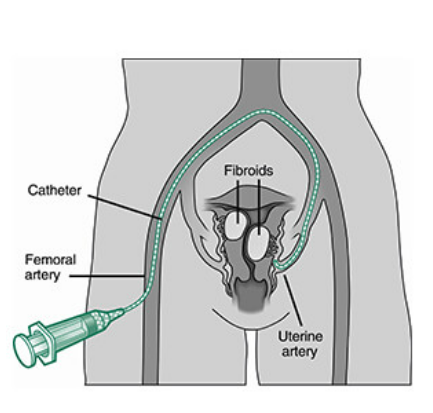About Uterine Fibroids
Uterine fibroids are noncancerous growths that affect 25-45% of women in the United States, sometimes resulting in debilitating pain and fertility issues. While surgery was once the primary treatment for uterine fibroids, ARA Health offers cutting-edge, nonsurgical treatment options right here in Asheville, NC.
Request a consultation with our specialist by calling 828.436.5500.
Schedule NowAm I a fit?
Answering a few quick questions will help us determine whether a minimally invasive procedure is right for you.
Take The TestUterine Fibroid Embolization (UFE) can relieve symptoms without compromising fertility.
1/3 of the hysterectomies performed annually in the United States are due to fibroids.
Most insurance plans cover UFE.
You have questions. We have answers.
Below you'll find answers to some of the questions we are commonly asked by patients. Please contact our ARA Cares Coordinator at (828) 436-5500 with any additional questions or concerns.
Some women may not know they have uterine fibroids if symptoms are not present. However, there are some fibroids that can come with tell-tale signs, including:
- Excessive or painful bleeding during periods and/or bleeding longer than one week
- Bleeding or spotting between periods
- Pelvic pressure or pain, especially during intercourse
- Frequent urination
- Low back pain
- Constipation
- Chronic vaginal discharge
- Increased abdominal enlargement or a feeling of fullness or bloating
There are four main types of fibroids that can affect women: intramural, subserosal, submucosal, or pedunculated. A woman might have one or more of these types of fibroids, and while some may not cause any symptoms, others can be quite troublesome. Moreover, certain types of fibroids can potentially hinder conception, lead to pregnancy loss, or raise the risk of pregnancy-related complications.
The following risk factors impact your chances of developing uterine fibroids:
- Age. Fibroids typically affect reproductive age/pre-menopausal women.
- Race. Black women are more likely to develop fibroids, typically starting at a younger age and developing more fibroids that tend to be larger in size and bring more severe symptoms.
- Heredity. Women whose female relatives had uterine fibroids are at an increased risk.
- Early menstruation. Starting your period at an earlier age increases your risk for fibroids.
- Diet. Women with diets that are higher in red meat and lower in vegetables, fruit, and dairy are more likely to develop fibroids. Drinking alcohol and/or being obese can also contribute.
- Vitamin D deficiency.
 Uterine fibroid embolization (UFE), also known as uterine artery embolization (UAE), begins with a small incision made in the groin area or wrist. This allows the interventional radiologist (IR) to access the arteries that supply blood to the fibroids.
Uterine fibroid embolization (UFE), also known as uterine artery embolization (UAE), begins with a small incision made in the groin area or wrist. This allows the interventional radiologist (IR) to access the arteries that supply blood to the fibroids.
Using specialized X-ray equipment, the IR inserts a catheter (a small tube) through the incision and guides it to the uterine artery, near the location of the fibroid tumor. Once the catheter reaches the fibroid site, small spheres called embolic material are injected through the catheter into the blood vessels that feed the fibroids. This process cuts off the oxygenated blood supply to the fibroids, causing them to shrink. The embolic material remains in the blood vessels at the fibroid site permanently.
 The catheter is then repositioned to the other side of the uterus to repeat the embolization procedure on the other uterine artery. Once the IR completes embolization on both sides, the catheter is gently removed. The entire UFE treatment typically takes less than one hour to complete.
The catheter is then repositioned to the other side of the uterus to repeat the embolization procedure on the other uterine artery. Once the IR completes embolization on both sides, the catheter is gently removed. The entire UFE treatment typically takes less than one hour to complete.
In addition to preserved fertility and a short recovery, UFE has outstanding long term results, meaning often no further treatments or repeated interventions are usually necessary.
Sometimes seeing is believing.
Check out our video/s to learn more about UFE, a nonsurgical procedure that can treat your uterine fibroids with less trauma to the body than traditional surgery – and a much quicker recovery.
Is UFE right for me?
Find out if you're a candidate for this minimally invasive procedure. The test takes less than 5 minutes, and our consultations are free of charge.
Take The TestSchedule a consultation today.
It's quick and easy. Our ARA Coordinators are here to assist yo with all of your needs, starting with making an appointment. Reach out today. ARA cares, and we're here to help.
Schedule NowAre You a Candidate for Uterine Fibroid Embolization? Take our Quiz!
Uterine fibroid embolization (UFE) is a transformative procedure for women seeking long term relief from burdensome uterine fibroids. To find out if you may be a candidate, take our quiz below:
If you answered yes to three or more of these questions, you may be eligible to undergo UFE. Request a consultation with our specialist by calling 828.436.5500 or filling out our scheduling form.




